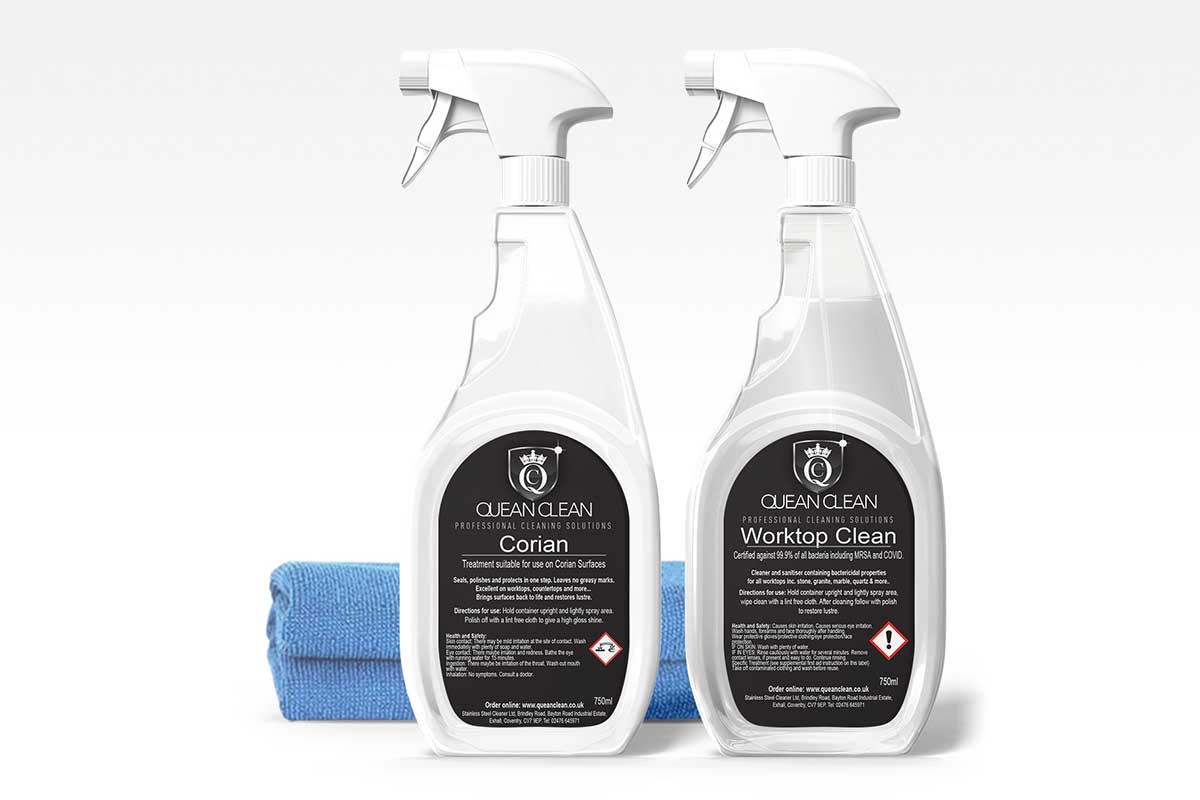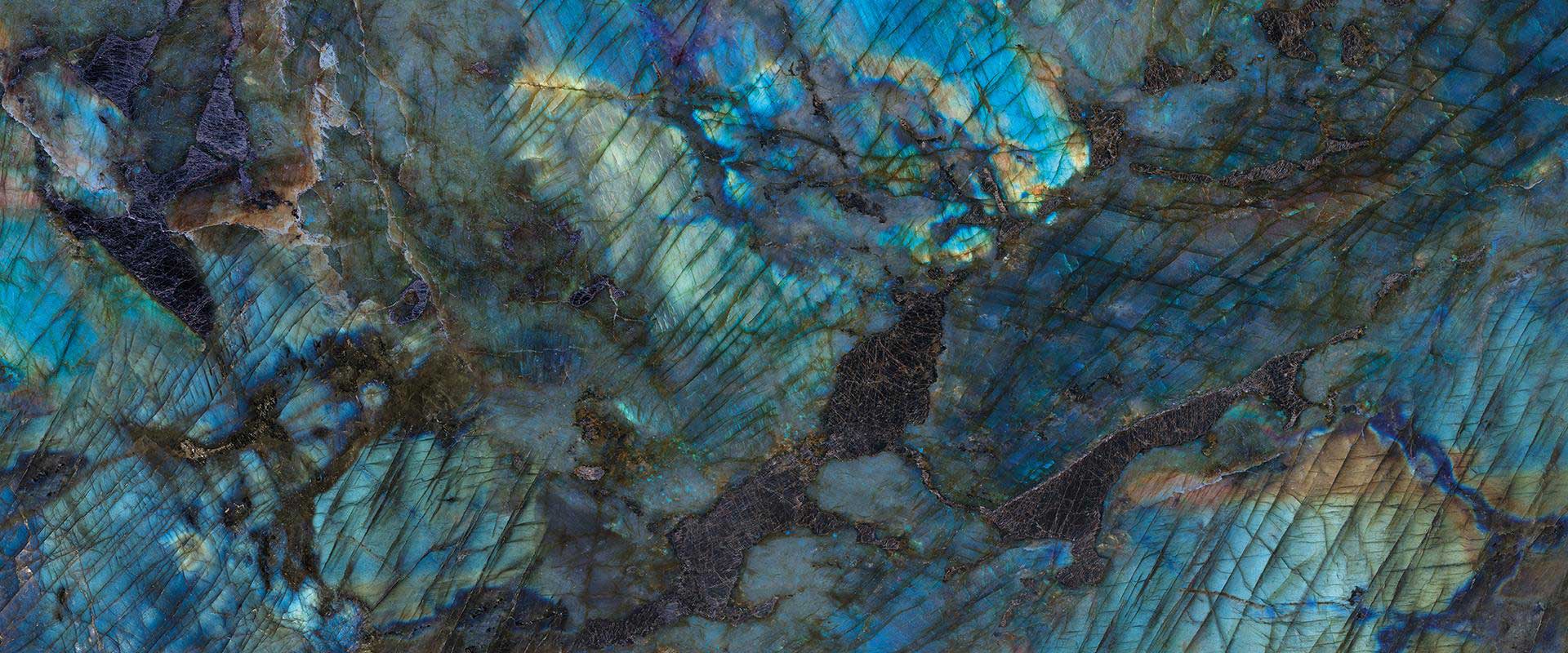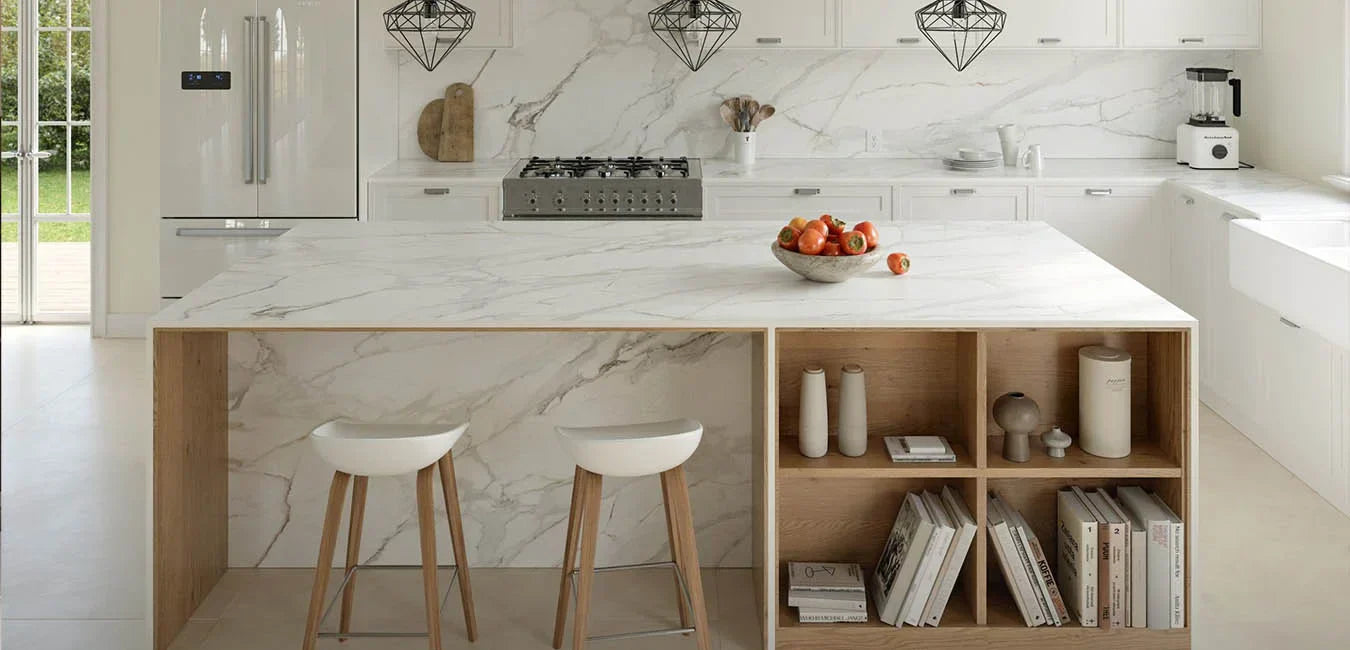
How to take scratches out of kitchen worktops
We’ve pulled together this handy guide on how to take scratches out of kitchen worktops. Other than the floor, kitchen worktops have to withstand the greatest amount of wear and tear.
They are exposed to knife cuts, chopping, heat, cookware being dragged across them, oils, spills, dirt, and grime. Constant use and abuse will eventually leave dull patches and scratches even on the best worktop materials, making them look lacklustre.
Severe damage will usually require professional intervention, but with proper care and careful restoration, all the top-end worktop materials can be made to look new again.
It is crucial to remove scratches as soon as possible and not leave them until the damage is beyond your capacity to repair. Darker colours will require more care than lighter colours.
This article highlights some of the easiest and most effective methods to remove scratches from the most popular types of worktops.
For professional advice or expert onsite repairs, you can contact us online or call us on 0330 088 3391 for more information.
For over 10 years, Worktops.net has been delivering high-quality products and services related to the kitchen and bathroom industry in the UK.
Solid surface worktops
Solid surface worktops such as Corian, Diore, Hanex, and Hi-MACS are tough, but not entirely scratch-proof.
Before starting any actions to remove scratches from solid surface kitchen worktops, it should be borne in mind that each type of finish (matte, satin, semi-gloss, and high-gloss) will require a different approach. Worktops.net offers a Corian® Worktop Care and Maintenance Kit for each type of finish, which helps you keep your solid surface countertops looking brand new for years.
Thoroughly clean your solid surface worktop and remove watermarks with a formulated cleaner, warm soapy water, or ammonia-based cleaners to remove all dirt and grime before attempting to remove scratches. Do not use window cleaners, as they will leave a waxy build-up.
Please note: High-gloss finishes will require proper tools and techniques to get a uniform finish and even on semi-gloss surfaces it is not easy to obtain a uniform finish by hand.
Method
To remove very fine scratches, buff them out with non-abrasive furniture wax or car wax in small circular motions, working from the front to the back, then side to side, overlapping the circles.
Light scratches can be removed by rubbing a furniture paste wax on the area with a soft cloth or wool pad in circular motions, working from front to back, then side-to-side, until the scratch is no longer visible, then buffing it to the right finish with a wax polish.
Slightly deeper scratches may require buffing with a lightly abrasive liquid countertop cleaner, or a baking soda paste, gradually moving up the scale of abrasive methods.
Only on matte surfaces with deeper scratches (not gloss and semi-gloss), you may use sandpaper and water, starting with micron or P-grade paper, working up to P240 grit.
Then reverse the process, ending by polishing the surface to the right texture with furniture wax. Take great care not to leave patches by working outward in circular motions, starting from front to back, then side to side.
Renew a matte surface using a Scotch-Brite pad for a semi-gloss finish and water.
Remove any excess wax and wipe the entire surface with a damp cloth.
Deeper scratches will need to be sanded out or filled in with a special acrylic polymer resin. Attempt this only if you are experienced and have the correct equipment.
Rinse the surface and dry thoroughly. If any scratches remain, repeat the process.
Ultra-Compact/ Sintered stone worktops
Ultra-Compact worktops like Neolith, Dekton, and Diore Ultra, are used for flooring in high-traffic areas. In the unlikely event of scratches, rub the scratch with a baking soda paste, or use a specially designed kit for the best results.
Quartz worktops
Quartz worktops like Silestone, Diore Quartz, Cambria, Caesarstone, Compac, and Technistone, are almost impossible to scratch. If it does happen, you can buff it out with a baking soda paste, while deeper scratches will have to be filled in with a special quartz repair filler, or fast-setting super glue. Thoroughly clean the surface, carefully fill the scratch using a plastic putty knife or razor blade, taking care to scrape the glue level with the rest of the surface and to wipe up any spills before the glue dries.
Excess superglue can be removed with acetone.
Granite worktops
Granite and Sensa Granite worktops are not easily scratched, but when it does, rub it in small circular motions with baking soda paste, working outward in overlapping circles.
For slightly deeper scratches, rub the wet paste with a 0000-grade steel wool pad.
If the scratch is too deep for that, use a 100 grit diamond sanding pad and water, but take care not to cause more damage, because the diamond pad is harder than the granite.
Do not forget to reapply a sealant.
Marble worktops
Marble is still seen by many as the standard for kitchen worktops and lends special elegance to any kitchen. Unfortunately, marble is quite soft and vulnerable to scratches if not protected by coasters or placemats.
Before removing scratches, clean the entire surface with warm soapy water or detergent and remove watermarks with baking soda.
Using polishing powder, gently rub the scratched area with very fine steel wool and water. If this does not remove the scratches, progress to fine-grit sandpaper, gradually increasing the abrasiveness. When the scratch has been removed, buff the entire surface with marble polish in small circular motions, working first from front to back and then from side to side.
Rinse the surface and dry thoroughly and apply sealant.
Wood
Sand off any varnish or surface coating with fine-grit sandpaper. It is recommended that the coating on the entire surface is removed to ensure a uniform finish at the end.
Sand out the scratches in the wood with 240-grit sandpaper, sanding with the grain, or using a power sander.
Again, using fine-grit sandpaper, smooth the entire surface and reapply the finishing coat in thin layers.
Glass
Thoroughly clean the glass countertop, using an ammonia-based cleaner to remove any greasiness or waxy build-up. Polish out the scratch, using a thin paste of baking soda and a soft cloth. Work in small circular motions from the front to the back and then side to side.
Stainless steel
Stainless steel countertops are hardwearing but vulnerable to cuts and scratches over time.
Light scratches can be buffed out with a non-abrasive solution, such as baking soda paste, and to regain the sheen, buff the surface vigorously with vegetable oil, car wax, or furniture wax.
If the scratches are deeper, progress to a more abrasive compound, and as a last resort, use P-grade sandpaper and water. This might dull the surface though, and additional buffing will be required.
When you have finished, rinse and wipe the surface with a wet cloth, dry it thoroughly and polish the surface with car wax.
Laminate Kitchen Worktops
The best-quality laminate worktops are hard-wearing and fairly resistant to scratches.
Light scratches can be removed, but if the damage is severe, it may be more cost-effective to replace them.
The best way to fix scratches on laminate worktops is to fill them with a colour-matching repair filler, but fine scratches could be covered with countertop polish or colour-matched car wax or furniture paste.
Start by cleaning the countertop thoroughly with warm, soapy water and a soft cloth. Cover the entire surface evenly with the wax paste to avoid blotches with a clean cloth, working the filler paste or wax into the scratches with a putty knife or spatula. Leave the filler, or wax to dry for a few minutes and then use a soft, clean cloth to buff the whole surface. Allow at least a day for the filler or wax to set before using that countertop.
Take care
Many of the methods above can be repeated for different types of worktop materials, but ensure you do not cause further damage with abrasive tools or materials. Make certain the method can be used on your worktop by testing it on a small unobtrusive area.
If you are still uncertain, consult the experts at Worktops.net. Contact us online or call us on 0330 088 3391 for more information.





